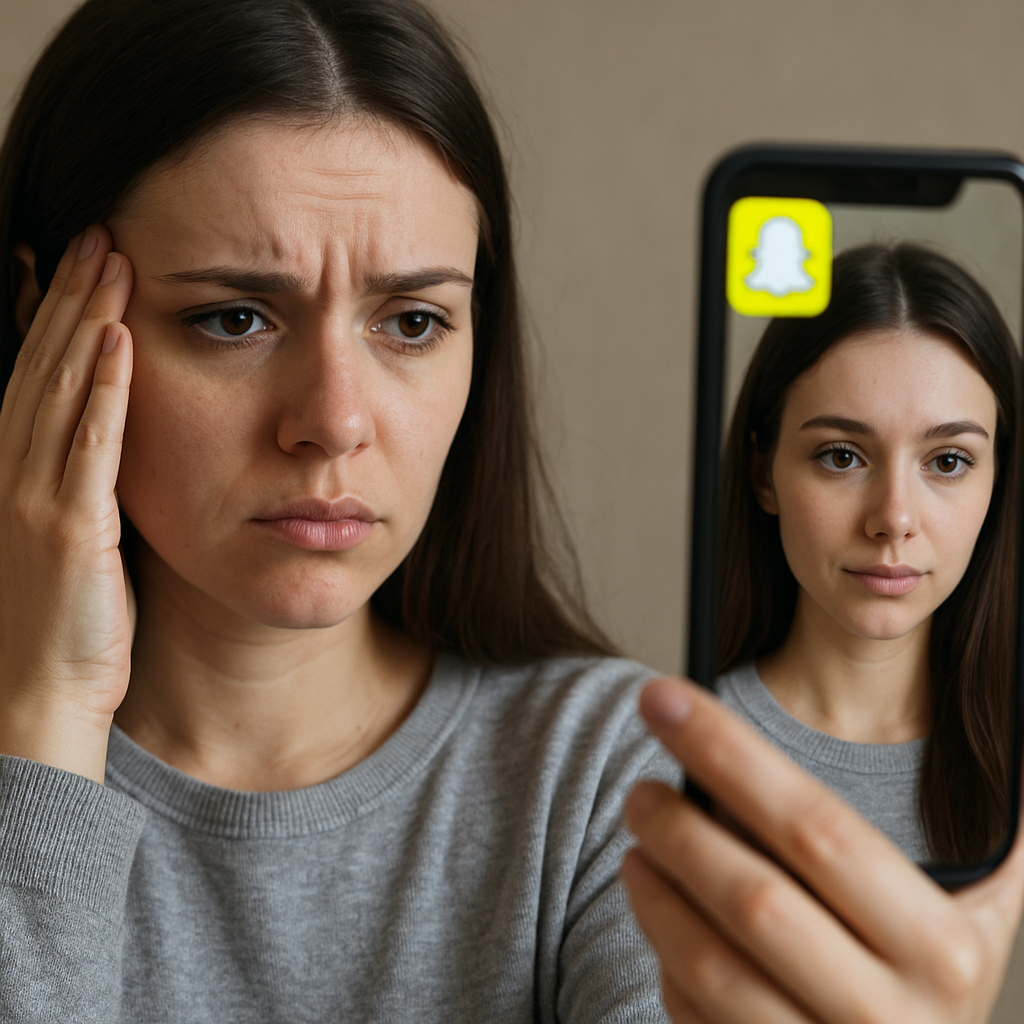When filters become reality and selfies shape self-worth, identity begins to blur
By Mursaleen Bashir
In an era where self-expression is increasingly filtered through the lens of social media, platforms like Snapchat and Instagram have redefined how people present themselves to the world. What was once a spontaneous snapshot of daily life has evolved into a carefully curated aesthetic—one polished with augmented beauty filters, airbrushed flaws, and algorithmically perfected features. But beneath this digital gloss lies a disturbing psychological trend now recognized as Snapchat Dysmorphia—a condition where individuals become obsessed with achieving the digitally altered versions of themselves.
The phenomenon stems from a broader mental health issue known as Body Dysmorphic Disorder (BDD), where individuals fixate on imagined or exaggerated physical flaws. Unlike traditional BDD, Snapchat Dysmorphia is deeply intertwined with social media and its culture of visual perfection. With just a swipe or tap, users can erase blemishes, enlarge eyes, reshape jaws, brighten skin, and enhance lips—creating a virtual persona that often bears little resemblance to reality. Over time, this exposure to hyper-edited self-images can deeply distort one’s perception, leading to dissatisfaction, insecurity, and in many cases, emotional distress.
What begins as harmless fun with filters soon becomes a slippery slope. For many, especially teens and young adults, the filtered self-starts to feel more acceptable than their natural appearance. The growing demand for cosmetic procedures to permanently mimic these filters is a chilling consequence. Surgeons report an increase in patients bringing in filtered selfies as reference photos—not of celebrities, but of their own digitally altered faces. This signals not just vanity, but a profound identity crisis rooted in unattainable standards of beauty.
Psychologically, the effects are damaging and far-reaching. Filters may offer a brief confidence boost, a fleeting high from likes and compliments. But this illusion quickly collapses once the filter is gone. The contrast between the real self and the edited image can trigger feelings of anxiety, depression, low self-worth, and shame. Users internalize the idea that they are only lovable or worthy when they look a certain way. This leads to a vicious cycle—posting more filtered content for validation, only to feel more disconnected from one’s authentic self.
The issue doesn’t stop at the individual level; it ripples into social relationships. People begin to avoid real-life interactions out of fear of being “seen” as they truly are. Social anxiety, isolation, and loneliness increase as confidence in one’s natural appearance erodes. The pressure to meet impossible beauty ideals—often set by influencers who themselves rely on digital touch-ups—feeds a culture of comparison and inadequacy. The more people chase this perfection, the more they lose sight of their inherent worth.

Spiritually, especially within the Islamic worldview, this obsession with image conflicts with the core teachings of modesty, gratitude, and divine acceptance. Islam emphasizes inner beauty—ikhlaaq (good character), humility, and sincerity—over outward appearance. The Prophet Muhammad (SAW) reminded us that Allah does not look at your appearance or wealth, but at your hearts and deeds. When we attempt to digitally “correct” what Allah, Al-Khaliq (The Creator), has fashioned, we are in essence rejecting His wisdom. Every feature, every imperfection, is part of a divine design meant to guide us toward a deeper purpose.
Moreover, presenting an enhanced version of ourselves online isn’t just self-deceptive—it’s ethically problematic. In Islam, sincerity (ikhlas) and truthfulness (sidq) are foundational values. When filtered images become the norm, they subtly deceive others, setting false expectations and undermining authenticity. Relationships built on illusions are fragile; trust withers when reality peeks through the cracks of virtual perfection. As a saying goes, “If deception were excusable, even the devil would sit near God.” By masking our true selves, we not only betray others—we betray our own truth.
The way forward lies in reclaiming authenticity. Mental health experts encourage mindful social media use, digital detoxes, and strengthening real-world connections over virtual likes. Self-acceptance, though difficult in a comparison-driven world, is essential for emotional and spiritual well-being. Islam invites believers to be thankful for their unique form and to see their physical features as signs of divine mercy. Choosing to embrace our natural selves is an act of self-love and spiritual maturity.
Understanding Snapchat Dysmorphia is not just a clinical concern—it’s a cultural and moral imperative. The challenge is not in resisting filters altogether, but in resisting the belief that only the filtered self is worthy. Healing begins when we choose to value our real, unedited selves and recognize beauty in truth, not illusion.
True beauty isn’t pixel-perfect—it’s the quiet confidence of being content in your own skin. And in a world increasingly driven by appearances, authenticity may be the boldest act of all.
Leave a Reply